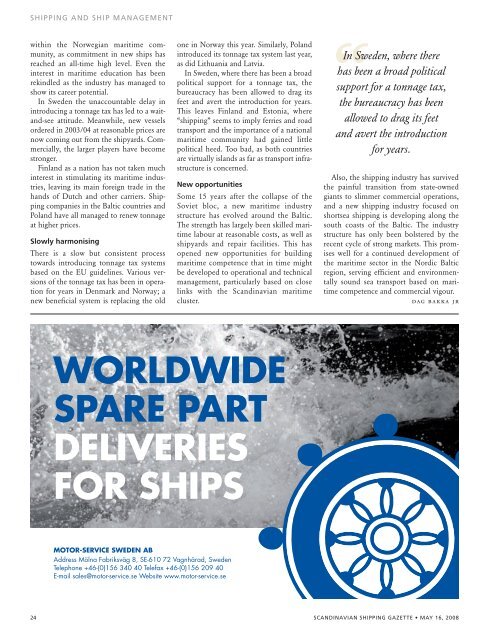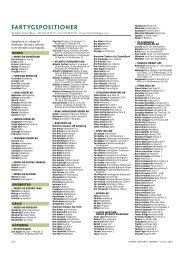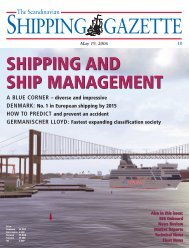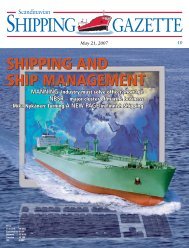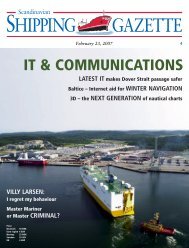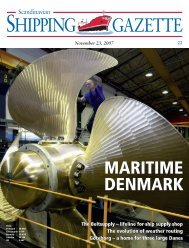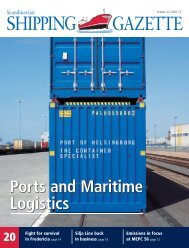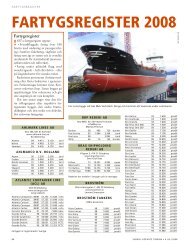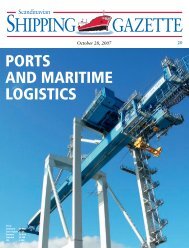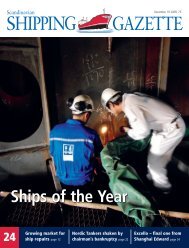SSG No 10 - Shipgaz
SSG No 10 - Shipgaz
SSG No 10 - Shipgaz
- TAGS
- shipgaz
- shipgaz.com
Create successful ePaper yourself
Turn your PDF publications into a flip-book with our unique Google optimized e-Paper software.
SHIPPING AND SHIP MANAGEMENT<br />
within the <strong>No</strong>rwegian maritime community,<br />
as commitment in new ships has<br />
reached an all-time high level. Even the<br />
interest in maritime education has been<br />
rekindled as the industry has managed to<br />
show its career potential.<br />
In Sweden the unaccountable delay in<br />
introducing a tonnage tax has led to a waitand-see<br />
attitude. Meanwhile, new vessels<br />
ordered in 2003/04 at reasonable prices are<br />
now coming out from the shipyards. Commercially,<br />
the larger players have become<br />
stronger.<br />
Finland as a nation has not taken much<br />
interest in stimulating its maritime industries,<br />
leaving its main foreign trade in the<br />
hands of Dutch and other carriers. Shipping<br />
companies in the Baltic countries and<br />
Poland have all managed to renew tonnage<br />
at higher prices.<br />
Slowly harmonising<br />
There is a slow but consistent process<br />
towards introducing tonnage tax systems<br />
based on the EU guidelines. Various versions<br />
of the tonnage tax has been in operation<br />
for years in Denmark and <strong>No</strong>rway; a<br />
new beneficial system is replacing the old<br />
one in <strong>No</strong>rway this year. Similarly, Poland<br />
introduced its tonnage tax system last year,<br />
as did Lithuania and Latvia.<br />
In Sweden, where there has been a broad<br />
political support for a tonnage tax, the<br />
bureaucracy has been allowed to drag its<br />
feet and avert the introduction for years.<br />
This leaves Finland and Estonia, where<br />
“shipping” seems to imply ferries and road<br />
transport and the importance of a national<br />
maritime community had gained little<br />
political heed. Too bad, as both countries<br />
are virtually islands as far as transport infrastructure<br />
is concerned.<br />
New opportunities<br />
Some 15 years after the collapse of the<br />
Soviet bloc, a new maritime industry<br />
structure has evolved around the Baltic.<br />
The strength has largely been skilled maritime<br />
labour at reasonable costs, as well as<br />
shipyards and repair facilities. This has<br />
opened new opportunities for building<br />
maritime competence that in time might<br />
be developed to operational and technical<br />
management, particularly based on close<br />
links with the Scandinavian maritime<br />
cluster.<br />
WORLDWIDE<br />
SPARE PART<br />
DELIVERIES<br />
FOR SHIPS<br />
MOTOR-SERVICE SWEDEN AB<br />
Address Mölna Fabriksväg 8, SE-6<strong>10</strong> 72 Vagnhärad, Sweden<br />
Telephone +46-(0)156 340 40 Telefax +46-(0)156 209 40<br />
E-mail sales@motor-service.se Website www.motor-service.se<br />
In Sweden, where there<br />
has been a broad political<br />
support for a tonnage tax,<br />
the bureaucracy has been<br />
allowed to drag its feet<br />
and avert the introduction<br />
for years.<br />
Also, the shipping industry has survived<br />
the painful transition from state-owned<br />
giants to slimmer commercial operations,<br />
and a new shipping industry focused on<br />
shortsea shipping is developing along the<br />
south coasts of the Baltic. The industry<br />
structure has only been bolstered by the<br />
recent cycle of strong markets. This promises<br />
well for a continued development of<br />
the maritime sector in the <strong>No</strong>rdic Baltic<br />
region, serving efficient and environmentally<br />
sound sea transport based on maritime<br />
competence and commercial vigour.<br />
dag bakka jr<br />
24 SCANDINAVIAN SHIPPING GAZETTE • MAY 16, 2008


